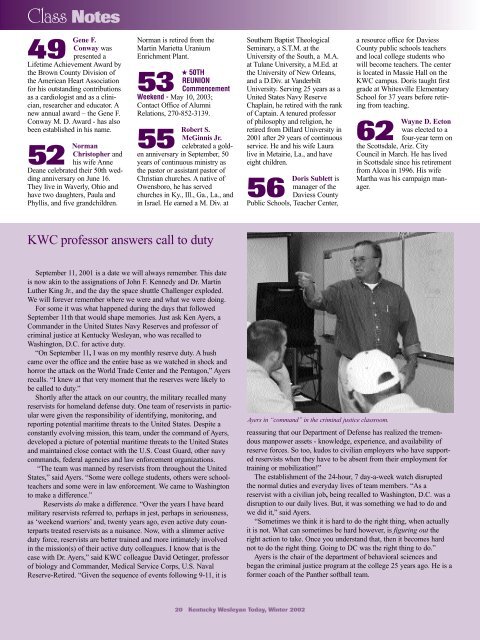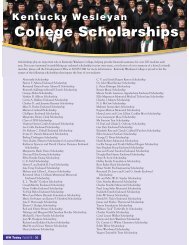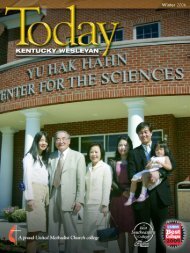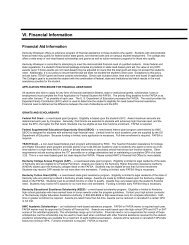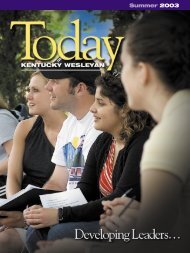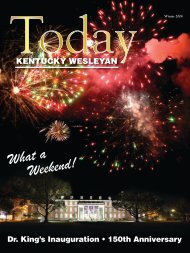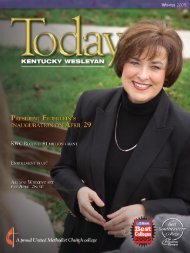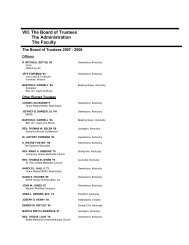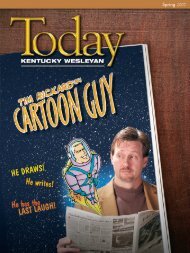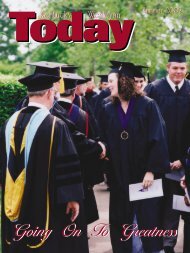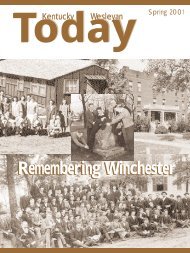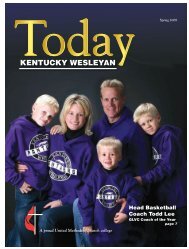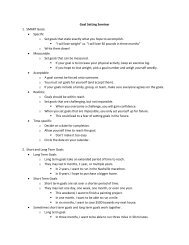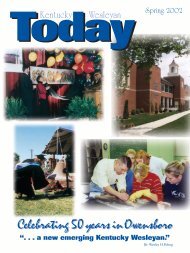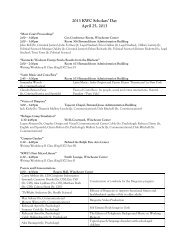FALL TODAY 2002 - Kentucky Wesleyan College
FALL TODAY 2002 - Kentucky Wesleyan College
FALL TODAY 2002 - Kentucky Wesleyan College
Create successful ePaper yourself
Turn your PDF publications into a flip-book with our unique Google optimized e-Paper software.
Class Notes<br />
49<br />
Gene F.<br />
Conway was<br />
presented a<br />
Lifetime Achievement Award by<br />
the Brown County Division of<br />
the American Heart Association<br />
for his outstanding contributions<br />
as a cardiologist and as a clinician,<br />
researcher and educator. A<br />
new annual award – the Gene F.<br />
Conway M. D. Award - has also<br />
been established in his name.<br />
52<br />
Norman<br />
Christopher and<br />
his wife Anne<br />
Deane celebrated their 50th wedding<br />
anniversary on June 16.<br />
They live in Waverly, Ohio and<br />
have two daughters, Paula and<br />
Phyllis, and five grandchildren.<br />
Norman is retired from the<br />
Martin Marietta Uranium<br />
Enrichment Plant.<br />
53<br />
★ 50TH<br />
REUNION<br />
Commencement<br />
Weekend - May 10, 2003;<br />
Contact Office of Alumni<br />
Relations, 270-852-3139.<br />
55<br />
Robert S.<br />
McGinnis Jr.<br />
celebrated a golden<br />
anniversary in September, 50<br />
years of continuous ministry as<br />
the pastor or assistant pastor of<br />
Christian churches. A native of<br />
Owensboro, he has served<br />
churches in Ky., Ill., Ga., La., and<br />
in Israel. He earned a M. Div. at<br />
Southern Baptist Theological<br />
Seminary, a S.T.M. at the<br />
University of the South, a M.A.<br />
at Tulane University, a M.Ed. at<br />
the University of New Orleans,<br />
and a D.Div. at Vanderbilt<br />
University. Serving 25 years as a<br />
United States Navy Reserve<br />
Chaplain, he retired with the rank<br />
of Captain. A tenured professor<br />
of philosophy and religion, he<br />
retired from Dillard University in<br />
2001 after 29 years of continuous<br />
service. He and his wife Laura<br />
live in Metairie, La., and have<br />
eight children.<br />
56<br />
Doris Sublett is<br />
manager of the<br />
Daviess County<br />
Public Schools, Teacher Center,<br />
a resource office for Daviess<br />
County public schools teachers<br />
and local college students who<br />
will become teachers. The center<br />
is located in Massie Hall on the<br />
KWC campus. Doris taught first<br />
grade at Whitesville Elementary<br />
School for 37 years before retiring<br />
from teaching.<br />
62<br />
Wayne D. Ecton<br />
was elected to a<br />
four-year term on<br />
the Scottsdale, Ariz. City<br />
Council in March. He has lived<br />
in Scottsdale since his retirement<br />
from Alcoa in 1996. His wife<br />
Martha was his campaign manager.<br />
KWC professor answers call to duty<br />
September 11, 2001 is a date we will always remember. This date<br />
is now akin to the assignations of John F. Kennedy and Dr. Martin<br />
Luther King Jr., and the day the space shuttle Challenger exploded.<br />
We will forever remember where we were and what we were doing.<br />
For some it was what happened during the days that followed<br />
September 11th that would shape memories. Just ask Ken Ayers, a<br />
Commander in the United States Navy Reserves and professor of<br />
criminal justice at <strong>Kentucky</strong> <strong>Wesleyan</strong>, who was recalled to<br />
Washington, D.C. for active duty.<br />
“On September 11, I was on my monthly reserve duty. A hush<br />
came over the office and the entire base as we watched in shock and<br />
horror the attack on the World Trade Center and the Pentagon,” Ayers<br />
recalls. “I knew at that very moment that the reserves were likely to<br />
be called to duty.”<br />
Shortly after the attack on our country, the military recalled many<br />
reservists for homeland defense duty. One team of reservists in particular<br />
were given the responsibility of identifying, monitoring, and<br />
reporting potential maritime threats to the United States. Despite a<br />
constantly evolving mission, this team, under the command of Ayers,<br />
developed a picture of potential maritime threats to the United States<br />
and maintained close contact with the U.S. Coast Guard, other navy<br />
commands, federal agencies and law enforcement organizations.<br />
“The team was manned by reservists from throughout the United<br />
States,” said Ayers. “Some were college students, others were schoolteachers<br />
and some were in law enforcement. We came to Washington<br />
to make a difference.”<br />
Reservists do make a difference. “Over the years I have heard<br />
military reservists referred to, perhaps in jest, perhaps in seriousness,<br />
as ‘weekend warriors’ and, twenty years ago, even active duty counterparts<br />
treated reservists as a nuisance. Now, with a slimmer active<br />
duty force, reservists are better trained and more intimately involved<br />
in the mission(s) of their active duty colleagues. I know that is the<br />
case with Dr. Ayers,” said KWC colleague David Oetinger, professor<br />
of biology and Commander, Medical Service Corps, U.S. Naval<br />
Reserve-Retired. “Given the sequence of events following 9-11, it is<br />
Ayers in “command” in the criminal justice classroom.<br />
reassuring that our Department of Defense has realized the tremendous<br />
manpower assets - knowledge, experience, and availability of<br />
reserve forces. So too, kudos to civilian employers who have supported<br />
reservists when they have to be absent from their employment for<br />
training or mobilization!”<br />
The establishment of the 24-hour, 7 day-a-week watch disrupted<br />
the normal duties and everyday lives of team members. “As a<br />
reservist with a civilian job, being recalled to Washington, D.C. was a<br />
disruption to our daily lives. But, it was something we had to do and<br />
we did it,” said Ayers.<br />
“Sometimes we think it is hard to do the right thing, when actually<br />
it is not. What can sometimes be hard however, is figuring out the<br />
right action to take. Once you understand that, then it becomes hard<br />
not to do the right thing. Going to DC was the right thing to do.”<br />
Ayers is the chair of the department of behavioral sciences and<br />
began the criminal justice program at the college 25 years ago. He is a<br />
former coach of the Panther softball team.<br />
20 <strong>Kentucky</strong> <strong>Wesleyan</strong> Today, Winter <strong>2002</strong>


